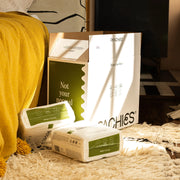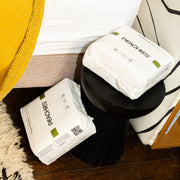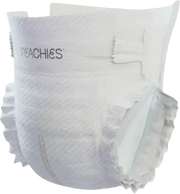Gut Health Tips from Talia, INDI’s In-House Nutritionist
Talia is the in-house nutritionist at INDI Supplements, offering simple but smart solutions to fill common nutrition gaps and power busy lives.
Your gut health is at the centre of almost everything - digestion, immunity, energy, mood, hormone balance and risk of chronic disease. A healthy gut doesn’t just keep you regular; it helps your whole body thrive.
Here are 5 simple, practical gut health tips you can slot into everyday life:
1) Add in, don’t restrict
Think abundance, not restriction. Instead of cutting foods out, add more plants into your family’s meals whenever you can.
Quick wins:
- Toss frozen vegetables like peas or spinach into pasta sauces or stir-fries.
- Stir a jar of beans or a pack of lentils into bolognese.
- Sprinkle mixed seeds onto yoghurt, porridge, toast or salads.
- Put out a bowl of fresh fruit on the kitchen counter.
When your plate is full of fibre-rich foods, there’s naturally less room (and fewer cravings) for ultra-processed options high in sugar, salt and preservatives. That’s the beauty of “adding in, not taking away” - you crowd out the less nourishing foods by filling up on the good stuff.
2) Fibre is your best friend
Fibre feeds the trillions of microbes in your gut and supports digestion, immunity, mood and hormone regulation. It also helps lower cholesterol, slows the absorption of glucose into the blood, and early evidence suggests it may even reduce microplastic build-up in the body.
Aim to fill at least half your plate with fibre-rich foods like:
- Colourful fruits and vegetables
- Whole grains
- Legumes (lentils, beans, chickpeas)
- Nuts and seeds
- Herbs and spices
Variety matters. Different plants contain different fibres, polyphenols and phytonutrients each with their own “skill set”. Buy mixed nuts, mixed beans, mixed salad leaves, mixed tomatoes and mixed peppers when you can. The more colour the better!
Go low and slow: when adding more fibre, increase gradually. Your gut bugs need time to adjust - think of it like throwing them a big party: at first they may get a little overexcited (hello, extra gas) but they’ll settle with time.
3) Snack smart
About 95% of people in the UK snack daily. Snacks account for ~25% of energy intake. That’s a huge opportunity to boost nutrition with simple swaps. It’s not how often you snack that matters, but what you snack on.
Smart snack ideas:
- Whole fruit (apple, pear, banana) + nuts, nut butter or Greek yoghurt
- Veggie sticks (cucumber, carrots, celery, pepper) + hummus or tzatziki
- Edamame beans
- Dark chocolate (70%+) + nuts or seeds
- Medjool date + nut butter + chia seeds
- Greek yoghurt + berries + flax seeds
- Roasted chickpeas
- Wholegrain toast + avocado + cucumber slices
- Popcorn + nuts + fruit or dark chocolate pieces
- Trail mix (dark chocolate, nuts, seeds, raisins)
- Energy balls (oats, nut butter, cacao powder, dates, seeds)
Life is busy, and healthy snacks aren’t always easy to find. If you’re after a convenient bar, try INDI’s Gut Bar - parent (and child!) friendly, high in fibre, low in sugar and free from emulsifiers. Tip: for children, start with half a bar so they can get used to the fibre.
4) Harness the power of plant protein
Plant proteins - lentils, chickpeas, beans, quinoa, brown rice, edamame, nuts and seeds tick two boxes at once: protein + fibre. A balanced, plant-rich diet provides all essential amino acids when you mix and match sources. Try swapping out red meat one night a week for plant protein, or go half-and-half (e.g., half bolognese, half lentils).
5) Add in fermented foods
Fermented foods can be a great source of probiotics - live strains of beneficial bacteria. Check labels for “live cultures” (pasteurisation can kill them).
Fermented foods to try:
- Live yoghurt
- Kimchi
- Miso
- Kefir
- Sauerkraut
- Some aged cheeses
If you’re new to fermented foods, start small and build up gradually to avoid bloating or discomfort.
6) Use supplements to fill in the gaps
Even with the best intentions, a complete and balanced diet can be hard to maintain. If you’re looking for tasty, convenient solutions to bolster your daily diet and fill common gaps (fibre, vitamin D, B complex, magnesium and more), try INDI supplements. With benefits you can feel, INDI taps into nature’s preventative medicine to support restorative sleep, a more focused mind and a body that pays you back every day.
7) Small changes add up
By adding more fibre, plant protein and fermented foods - and by choosing smarter snacks and supportive supplements you’re not just caring for your gut; you’re setting a healthy example for your kids, too.
Exclusive Offer for Peachies Customers: Enjoy £10 off your first purchase at Indi using code 10FORPARENTS. (Valid on orders over £25.)














